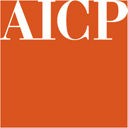-
Training & Certification



- Home
- Training & Certification
 AICP Certification In the planning field, American Institute of Certified Planners (AICP) certification is the accepted credential for professional competence and ethical practice. To become certified, a candidate must belong to APA, fulfill rigorous education and experience requirements, pass the AICP exam, and pay additional dues. Over 10,000 APA members have made this extra commitment and joined APA's professional institute. AICP's Certification Maintenance program (CM) recognizes certified planners' efforts to keep abreast of current issues in the profession.  Certification Maintenance Certified planners have demonstrated their commitment to high standards of professional practice. The example they set daily in their work and in their communities enhances the credibility of the planning profession. AICP's certification maintenance program gives certified planners another means of strengthening that credibility. Our communities are constantly changing and so too, is the planning profession. New theories, new laws, new planning tools and techniques are available to planners as they define and guide community change. AICP's Certification Maintenance program helps planners gain the knowledge and skills necessary to remain current in the practice of planning and continue to demonstrate professional credibility through continuing education. AICP members must earn a total of 32 CM credits (1 contact hour = 1 CM credit) within their two-year reporting period. All AICP members have a four month-grace period following the end of their current two-year reporting period. During the four-month grace period, members may continue to earn and log CM credits to fulfill their reporting period requirements. A minimum of 1.5 CM credits must include the topic of ethics, and another 1.5 credits must be on the topic of current planning law. AICP members may carry over a maximum of 16 CM credits from one reporting period into the subsequent reporting period; however, any surplus ethics and planning law credits will be carried over to the next two-year reporting period as general CM credits, not law or ethics. AICP members who do not meet CM requirements within two years will lose AICP certification and will be obliged to seek recertification within four years in order to regain the AICP credential. All professional development activities must be entered for CM credit by the provider. AICP members must claim CM credit after participation by using their online CM log. The list of CM events is growing every day, so please bookmark the CM Search webpage, and check back to see whether an event you attended has been added. For more information, please visit the American Planning Association.  Planning Webcast Series The Arkansas Chapter, along with 25 other states are members of a Planning Webcast Consortium. The purpose is to host free professional development webcasts aimed at urban planners and others interested in urban and regional planning. The webcasts offer AICP CM credit. You can earn over 40 CM credits annually from the comfort of your home or office. Check out the events page for upcoming webcasts! Interested in hosting a webcast? Please email Tim Conklin, Chapter PDO. | Planning Official Training Program These programs teach the fundamentals of working with a Planning Commissions in Arkansas. Training covers planning, zoning, application review, good governance, skilled meeting management, and more. Attendees include Planning Commissioners, Board of Adjustment members, Fire Chiefs, Mayors, City Council Members, and others. Three levels of training programs are offered. Individuals that successfully complete all three levels and a capstone home study can become Certified Arkansas Planning Officials. These programs are offered in partnership with the Arkansas Public Administration Consortium (APAC). To learn more, visit here. |
